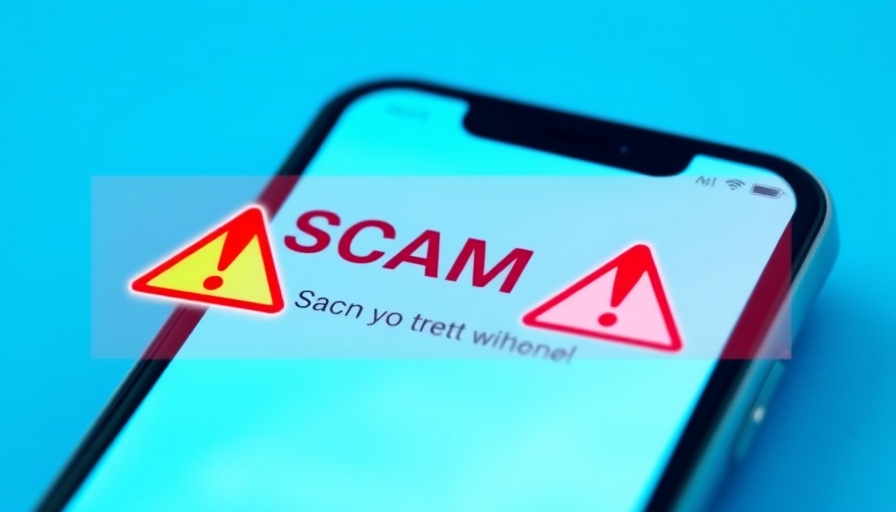
Ignore Scary Text Messages: They're Probably Scams
In an age dominated by digital communication, it's disheartening yet necessary to be vigilant against scams—especially those that pretend to be official messages from your state’s DMV. Anyone who has received a suspicious text claiming to be from the DMV might feel alarmed, especially when it comes with threats of fines, suspension, or prosecution for unpaid fines. It's important to recognize the signs of these scams to safeguard your personal information and peace of mind.
Understand the Threat: What is the DMV Scam Text?
The latest DMV scam texts use alarming language to prompt immediate action from recipients. Reports suggest that messages claim there are unresolved issues with driving records or unpaid fines, often using phrases that can instill panic. Recipients are warned of potential license suspensions or vehicle registration cancellations. First National Bank identifies patterns among these scams—while the wording may vary, the underlying theme remains consistent: threats designed to provoke a response before thinking. For instance, such texts may include a link leading to a fraudulent website where you may be urged to input sensitive personal details.
Spotting the Red Flags: How to Identify Fake Texts
As you navigate this scam landscape, it’s crucial to know how to identify fraudulent communications. Here are some key flags to watch for:
- Sender Verification: Confirm the sender's information; if you don’t recognize it and it doesn't match your DMV, it’s likely a scam.
- Threatening Language: Scammers use alarming messages to prompt a rash reaction. If the text invokes fear, take a step back.
- Links to Unfamiliar Websites: These links often lead to phishing sites designed to capture your personal data.
- Spelling and Grammar Errors: Professional organizations like the DMV typically communicate with proper language; errors are a clear indicator of scams.
Remember, legitimate DMV communications will never come via text message; they always utilize formal channels like paper letters to convey important information.
What Steps to Take if You’ve Been Scammed
If you find yourself meshed in a scam, it’s important to act quickly. Follow these steps:
- Contact your bank immediately to alert them of any potentially fraudulent charges.
- Monitor your financial accounts closely for any unusual activity.
- Consider freezing your credit to prevent identity theft.
- Reach out to local law enforcement, and don’t forget to report the scam on the FTC’s Fraud Reporting page.
Being proactive can mitigate the consequences of falling for scams and help safeguard your personal information from further exploitation.
Understanding the Larger Context: Why This Matters
This DMV scam is part of a broader trend of increasing digital fraud, highlighting the importance of digital literacy among consumers. With the rise of technology and online services comes the responsibility to stay informed and vigilant. The Federal Trade Commission states that consumers lose billions annually to scams, prompting the need to educate ourselves and our communities about recognizing and reporting fraudulent activity. The ongoing occurrence of scams only reinforces the necessity for homeowners and consumers alike in the MidSouth to empower themselves with knowledge.
Protecting Your Home and Well-Being: Don’t Fall for Scams
Scams can happen to anyone, and their emotional toll can be devastating. Recognizing the impact that such scams have on your mental health is crucial. The stress and anxiety of dealing with potential losses can ricochet throughout your life. By arming yourself with information, you can better protect not just your finances but your overall well-being as well. Staying engaged with community discussions and resources can further serve as a source of support and information for identifying threats.
Engaging with Your Midsouth Community: A Collective Action
Combating scams isn’t just an individual responsibility; it’s a community effort. In the MidSouth, residents can come together to share their experiences and knowledge about these scams, strengthening the local network against frauds. Through workshops, local law enforcement partnerships, or neighborhood organizations, residents can help each other stay informed. Consider setting up local meet-ups or online forums to discuss new information and personal experiences related to digital fraud.
A Call to Action: Stay Vigilant and Share Knowledge
Being informed is the first line of defense against scams like the DMV text alerts. Share this information with friends and family to equip them with the knowledge they need to combat these threats. Let’s create a safer, more informed community together by raising awareness about scams. Remember, awareness leads to empowerment!
 Add Row
Add Row  Add
Add 



Write A Comment